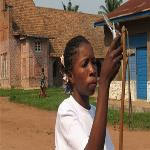
This is the VOA Special English Development Report.
Sending and receiving money by text message. Sharing crop prices. Just talking to a loved one far from home. These are some of the ways that mobile phones have changed lives in developing countries. Another way is through e-health, electronic health services.
One example is a telephone hotline in the Democratic Republic of Congo. Callers can receive information about family planning and the prevention of unwanted pregnancies. They are able to speak privately with trained operators about contraceptive methods and about health clinics.
The nonprofit group Population Services International and its partner Association de Sante Familiale launched the service in 2005. The United States Agency for International Development finances the program. And an agreement with the Vodacom company makes the service free to callers.
We talked with Jamaica Corker, on her cell phone, at the Population Services International office in the D.R.C.
JAMAICA CORKER: "The hotline has given us an opportunity to take advantage of cell phone technology, to reach people outside of our intervention zone with family planning messaging. In a country the size of western Europe, we can't be everywhere at the same time, and the hotline allows them to call in no matter where they are and to ask us the information that we can provide -- even if we're not necessarily able to provide the services directly."
Jamaica Corker says more than 20,000 people called the hotline in 2008, the latest year available. More than 80 percent were men. She says this is mainly because men own most of the phones.
The group also has family planning hotlines in Benin and Pakistan. And it is launching a mobile phone program to gather records on condom sales around Tanzania.
The journal Health Affairs recently published an issue on "E-Health in the Developing World." Editor Susan Dentzer says e-health is improving lives in different ways.
SUSAN DENTZER: "For example in Rwanda, where cell phone-based technologies are being used to keep track of dispensation of drugs to patients with H.I.V. And Rwanda is actually at the leading edge of developing nations in tapping these technologies to advance health and health care."
In South Africa, a campaign of text messages about H.I.V. led to a large increase in calls to the national AIDS helpline. And a program in Peru sends text messages to patients with H.I.V., reminding them to take their medicines.
And that's the VOA Special English Development Report, written by June Simms. Tell us about e-health services where you are. You can share ideas and find our programs at voaspecialenglish.com and on Facebook at VOA Learning English. That's also our address on Twitter, YouTube and iTunes. I'm Steve Ember.
In Kenya, a better life through mobile money
Mobile phone use soars in Africa
Solar phones bring sunshine to businesses in Africa
Web company joins fight to save African language
'Phones for Health' campaign targets AIDS in Africa
(来源:VOA 编辑:陈丹妮)
